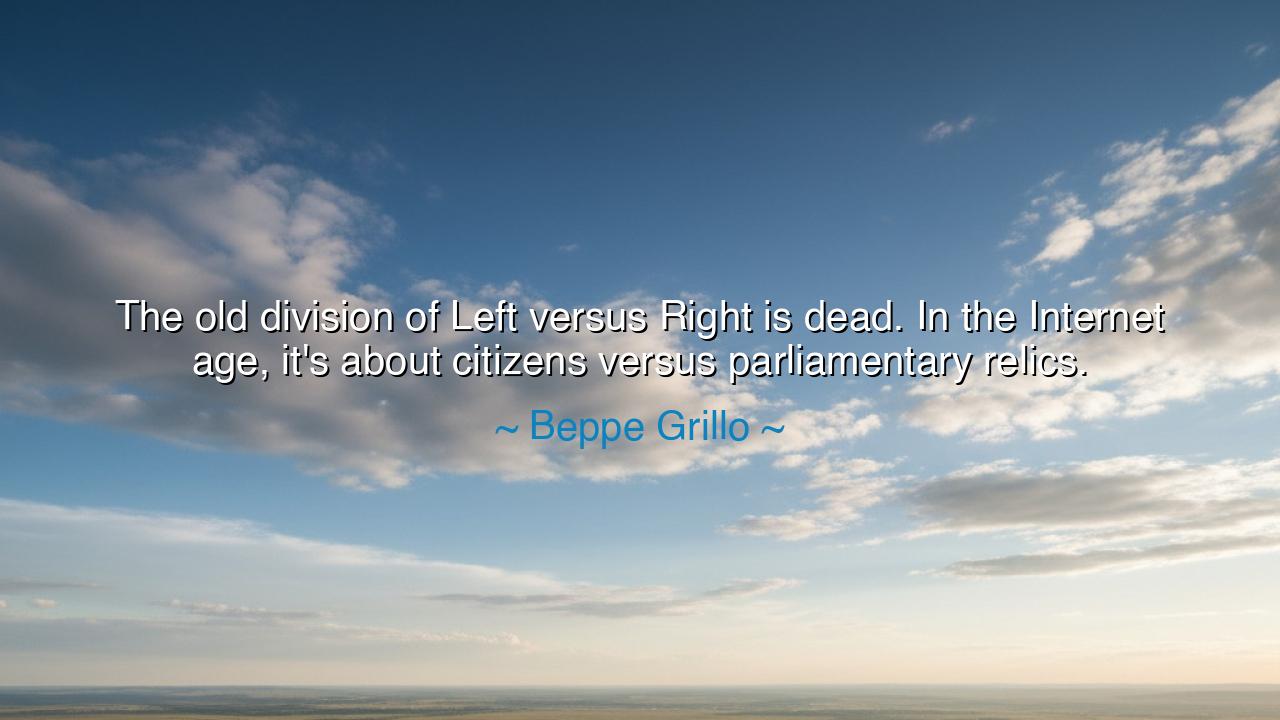
The old division of Left versus Right is dead. In the Internet
The old division of Left versus Right is dead. In the Internet age, it's about citizens versus parliamentary relics.






When Beppe Grillo declared, “The old division of Left versus Right is dead. In the Internet age, it’s about citizens versus parliamentary relics,” he was not merely speaking of politics — he was pronouncing a shift in the very soul of governance. His words carry the echo of revolution, a call to awaken from the slumber of outdated ideologies and to recognize the dawn of a new era: an era where information is power, and where the people, through the boundless web of connection, rise to reclaim their voices. The ancient struggle between Left and Right, between red and blue, has become a fading echo; in its place stands the truer conflict of our age — the governed versus the forgotten guardians of old institutions.
In the centuries past, politics was divided by grand visions — the Left fighting for equality and reform, the Right defending tradition and order. These forces, balanced in opposition, shaped the destiny of nations. Yet time, as it always does, transformed the battlefield. The Internet — that vast and living network — broke down the walls that once confined power to the few. No longer could truth be guarded by thrones, nor dissent silenced by distance. The citizen became both speaker and listener, actor and observer. In this digital age, the old categories crumbled, for information unites where ideology divides.
Grillo, a comedian turned political prophet, saw this truth early. His movement, born not in marble halls but on glowing screens, was built upon participation rather than hierarchy. To him, the “parliamentary relics” — those who clung to their titles and traditions — represented a dying age, where leaders spoke at the people instead of with them. His words are the cry of the modern tribune, calling citizens to seize the tools that technology has placed in their hands. He reminds us that the true power of democracy lies not in parties or politicians, but in connection, in the shared consciousness of free and informed individuals.
To understand the depth of this quote, we must look to history. There was a time when another great transformation took place — the printing press of Gutenberg, which shattered the monopoly of the Church over knowledge. What the press did for the Renaissance, the Internet has done for our age. It has awakened minds, empowered movements, and exposed corruption. Yet, just as the old priests resisted the new gospel of print, so too do today’s parliamentary relics resist the open discourse of the digital age. They speak of order, of procedure, of moderation, while the citizens demand transparency, immediacy, and truth. The struggle is no longer of class or creed, but of generation and adaptability — those who understand the power of the network, and those who fear it.
But Grillo’s words are not only political; they are philosophical. When he says the division of Left and Right is dead, he is not denying values — he is transcending them. He speaks to a world that has grown weary of labels and rhetoric, where people yearn not for ideology, but for authenticity. The citizens he invokes are not bound by parties; they are bound by purpose — by the shared desire to be heard, to participate, to shape their own futures. The Internet age has made prophets of ordinary people, and has exposed the emptiness of power divorced from truth.
Yet, as in all revolutions, there is danger. For the same network that connects can also deceive; the same voice that frees can also mislead. The citizen, empowered by the digital realm, must also learn wisdom — the wisdom to discern truth from illusion, to wield power with conscience, to remember that democracy without virtue becomes chaos. The fall of the old order must not become the rise of disorder. The age of citizens must also be the age of responsibility.
The origin of Grillo’s quote lies in the early years of his movement, Movimento 5 Stelle — a force born from frustration, yet fueled by hope. He saw in Italy, and across the world, that citizens were awakening to the corruption and stagnation of traditional power. His words are both prophecy and challenge: that the future belongs to those who adapt, who embrace transparency and dialogue. Like the ancient philosophers who stood in the agora to speak freely before their peers, the modern citizen now stands in the digital square, empowered to shape nations with the press of a key.
So let this teaching endure: Do not let your voice be silenced by the relics of the past. Whether in the palace or the forum, in parliament or on the net, speak truth. Demand honesty. Build connection. The Left and Right may fade, but the struggle between freedom and stagnation endures. Be among the citizens who carry light into the chambers of power. Use the tools of your age not for division, but for understanding, not for pride, but for participation. For as Beppe Grillo foresaw, the new politics is not about sides — it is about souls: those who awaken, and those who remain asleep in the ruins of the old world.






AAdministratorAdministrator
Welcome, honored guests. Please leave a comment, we will respond soon